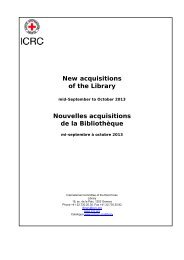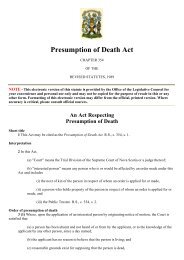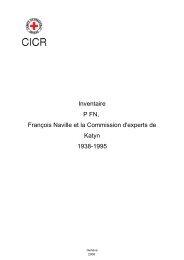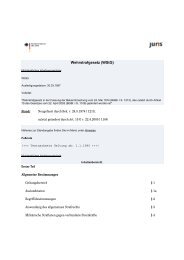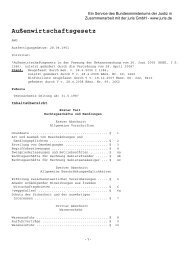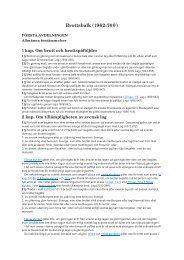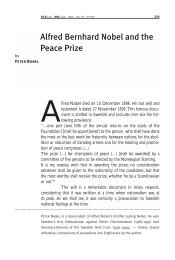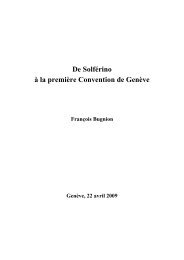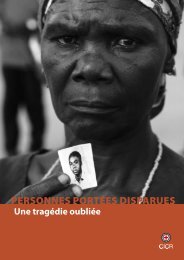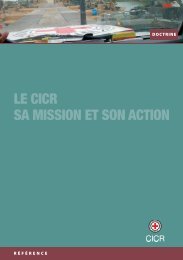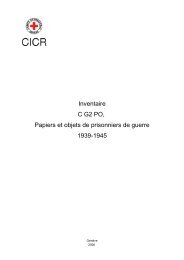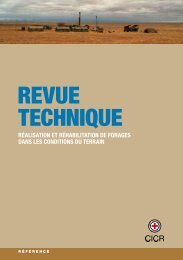Full text in PDF format - International Committee of the Red Cross
Full text in PDF format - International Committee of the Red Cross
Full text in PDF format - International Committee of the Red Cross
Create successful ePaper yourself
Turn your PDF publications into a flip-book with our unique Google optimized e-Paper software.
Colombia, Costa Rica, El Salvador,<br />
Guatemala, Honduras, Peru, St.<br />
V<strong>in</strong>cent and <strong>the</strong> Grenad<strong>in</strong>es and<br />
Tr<strong>in</strong>idad and Tobago.<br />
Law No. 2 24 was enacted <strong>in</strong> Peru.<br />
This law, which <strong>in</strong>corporates Article<br />
2 9-D that penalizes <strong>the</strong> use, production<br />
and transfer <strong>of</strong> antipersonnel<br />
m<strong>in</strong>es, was enacted on July 21st,<br />
200 and published <strong>in</strong> “El Peruano”,<br />
<strong>the</strong> Peruvian Official Gazette, on<br />
July 22nd, 200 .<br />
In September 200 , <strong>the</strong> <strong>Committee</strong><br />
for <strong>the</strong> Implementation <strong>of</strong> <strong>International</strong><br />
Humanitarian Law <strong>of</strong> Guatemala<br />
created a work<strong>in</strong>g group to<br />
discuss <strong>the</strong> actions required to assist<br />
victims <strong>of</strong> anti-personnel m<strong>in</strong>es <strong>in</strong><br />
<strong>the</strong> country. This is a follow-up <strong>of</strong><br />
<strong>the</strong> Nairobi Action Plan and <strong>the</strong> experts’<br />
meet<strong>in</strong>g held <strong>in</strong> Buenos Aires<br />
<strong>in</strong> August 200 to discuss “Weapons<br />
<strong>in</strong> <strong>International</strong> Humanitarian Law”.<br />
This group, which is formed by <strong>the</strong><br />
M<strong>in</strong>istry <strong>of</strong> Foreign Affairs and <strong>the</strong><br />
Congress <strong>Committee</strong> on Peace and<br />
Dem<strong>in</strong><strong>in</strong>g, receives ICRC advice. Its<br />
first activity was plann<strong>in</strong>g a survey<br />
to assess <strong>the</strong> number <strong>of</strong> anti-personnel<br />
m<strong>in</strong>e victims and where <strong>the</strong>y<br />
are located.<br />
At <strong>the</strong> end <strong>of</strong> <strong>the</strong> year, <strong>the</strong> Argent<strong>in</strong>e<br />
Senate is still discuss<strong>in</strong>g a bill<br />
on anti-personnel m<strong>in</strong>es, and <strong>the</strong><br />
national adm<strong>in</strong>istrations <strong>of</strong> Panama<br />
and Paraguay are also work<strong>in</strong>g<br />
on bills to enforce <strong>the</strong> Ottawa<br />
Treaty.<br />
Cultural Property <strong>in</strong> <strong>the</strong> Event <strong>of</strong><br />
Armed Conflict<br />
<strong>International</strong> humanitarian law<br />
also seeks to protect <strong>the</strong> cultural<br />
heritage <strong>of</strong> nations from <strong>the</strong> effects<br />
<strong>of</strong> armed conflicts. This goal seems<br />
particularly relevant today, s<strong>in</strong>ce<br />
many armed conflicts are ethnically<br />
motivated and even translate<br />
<strong>in</strong>to attacks aga<strong>in</strong>st cultural expressions.<br />
States have pledged to safeguard<br />
and respect cultural property<br />
from <strong>the</strong> effects <strong>of</strong> armed conflicts.<br />
This requires <strong>the</strong> States to take measures<br />
to safeguard cultural property.<br />
Respect for Cultural Property<br />
requires <strong>the</strong> States to refra<strong>in</strong> from<br />
any use <strong>of</strong> <strong>the</strong> property and its immediate<br />
surround<strong>in</strong>gs for purposes<br />
which are likely to expose <strong>the</strong>m to<br />
destruction or damage <strong>in</strong> <strong>the</strong> event<br />
<strong>of</strong> armed conflict, as well as to refra<strong>in</strong><br />
from any hostile act directed<br />
aga<strong>in</strong>st such property, particularly<br />
from attack<strong>in</strong>g <strong>the</strong>m.<br />
1. Participation <strong>in</strong> Relevant<br />
Treaties<br />
1954 Hague Convention for <strong>the</strong><br />
Protection <strong>of</strong> Cultural Property <strong>in</strong><br />
<strong>the</strong> Event <strong>of</strong> Armed Conflict<br />
This Convention establishes a general<br />
framework for <strong>the</strong> protection<br />
<strong>of</strong> cultural property.<br />
It has been ratified by 11 States, 20<br />
<strong>of</strong> which are from <strong>the</strong> Americas.<br />
…queda prohibido cometer actos<br />
de hostilidad dirigidos contra los<br />
monumentos históricos, las obras<br />
de arte o los lugares de culto que<br />
constituyen el patrimonio cultural o<br />
espiritual de los pueblos, y utilizarlos en<br />
apoyo del esfuerzo militar.<br />
Protocolo adicional II, 1977<br />
29<br />
Report on <strong>the</strong> Participation <strong>of</strong> <strong>the</strong> States <strong>in</strong> <strong>the</strong> Relevant Treaties Concern<strong>in</strong>g<br />
<strong>International</strong> Humanitarian Law and its National Implementation



